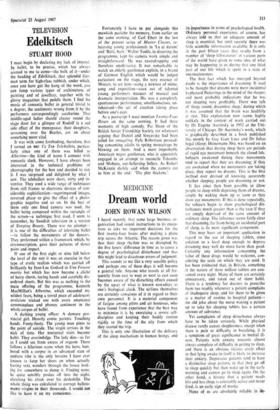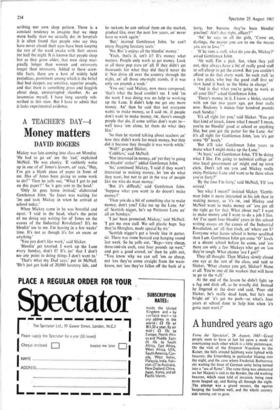Dream world
MEDICINE JOHN ROWAN WILSON
I heard recently that some large business or- ganisation had issued instructions to its execu- tives to take no important decisions for the first twenty-four hours after making a plane trip across the Atlantic. The reason given was that their sleep rhythm was so disrupted by the five hours difference in time as to cause a degree of psychological disturbance and that this might lead to disastrous errors of judgment.
This sounds to me like a very sensible policy and perhaps one of these days it will become a general rule. Anyone who travels at all fre- quently from east to west or west to east soon becomes aware of the disturbing effects caused by the upset of what is known nowadays as one's biological clock. The airlines themselves are certainly conscious of it in regard to their own personnel. It is a material component of fatigue among pilots and air hostesses, who have found from experience that the best way to minimise it is by exercising a severe self- discipline and keeping their bodily routine rigidly to the time of the city from which they started the trip.
This is only one illustration of the delicacy of the sleep mechanism in human beings, and its Inspottance in terms of psychological health. drdinary 'personal experience, of course, has always told us that an adequate amount of sleep is essential, but until recently there was little scientific information available. It is only in the past fifteen years that results from a number of 'sleep laboratories' in various parts of the world have given us some idea of what may be happening to us during that one third part of our life which is spent in a state of unconsciousness.
The first fact which has emerged beyond doubt is the importance of dreaming. It used to be thought that dreams were mere incidental haphazard flickerings in the mind of the sleeper,
and most probably indications that he was not sleeping very profitably. There was talk of deep, sound, dreamless sleep,' during which
it was assumed that the brain was healthily at rest. This explanation now seems 'highly unlikely in the context of work carried out by Dr Eugene Aserinsky in 1952 at the Uni- versity of Chicago. Dr Aserinsky's work, which is graphically described in a book published this month by Gay Gaer Luce and Dr Julius
Segal (Sleep; Heinemann 50s), was based on an observation that during sleep there are periods
of rapid eye movement beneath the closed lids.
Subjects awakened during these movements tend to report that they 'are dreaming; if they are awakened when no movements are taking
place, they report no dreams. This is the -fitit method ever devised of knowing accurately
whether sleeping people are dreaming or not.
It hhs since then been possible to allow people to sleep while depriving them of dreams, simply by waking them up as 'soon aS they show eye movements. If this is done repeatedly, the subjects begin to show psychological. 'dis-
turbances much greater than is the case if they are simply deprived of the same amount of ordinary sleep. The inference seems fairly clear that dreaming, far from being an incidental part of sleep, is its most significant component.
This may have an important application in regard to the use of sleeping tablets, since sedation to a level deep enough to depress dreaming may well do more harm than good. Certainly any information concerning the
value of these drugs would be welcome, con- sidering the scale on which they are used. It has been estimated that, in Britain, something in the nature of three million tablets are con- sumed every night. Many of them are certainly unnecessary, and taken out of sheer habit. There is a tendency for doctors to prescribe them too readily whenever a patient complains of inadequate sleep, and for them to be given as a matter of routine to hospital patients:— the old joke about the nurse waking a patient up to take his sleeping tablets has a certain amount of substance.
Yet complaints of sleep disturbance always have to be taken seriously. While physical disease rarely causes sleeplessness, except when there is pain or difficulty in breathing, it is a symptom of great significance in mental ill- ness. Patients with anxiety neurosis almost always complain of difficulty in getting to sleep, and there is an obvious vicious circle effect in that lying awake in itself is likely to increase their anxiety. Depressive patients tend to have a distinctive sleep pattern, in that they go off Co sleep quickly but then wake up in the early morning and cannot go to sleep again. On the other hand, a history that a patient needs less and less sleep, is constantly active and never tired, is an early sign of mania.
Nene of, us are absolutely reliable. in scribing our own sleep pattern. There is a constant tendency to imagine that we sleep more badly than we actually do; in hospitals it is often found that people who say they have never closed their eyes have been keeping the rest of the ward awake with their snores for half the night. It is known that people sleep less as they grow older, that men sleep mar- ginally longer than women and extroverts longer than introverts. Added to these scien- tific facts, there are a host of widely held prejudices, prominent among which is the belief that bad sleepers are sensitive, superior people, and that there is something gross and hoggish about deep, uninterrupted slumber. As an insomniac myself, I have long secretly sub- scribed to this view. But I have to admit that it lacks experimental evidence.































 Previous page
Previous page